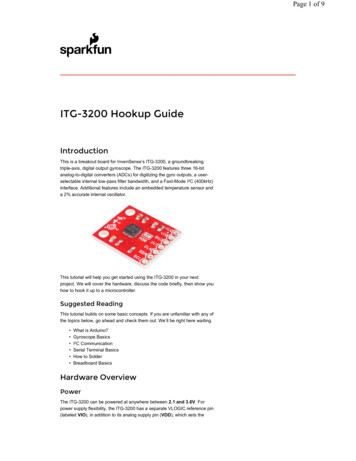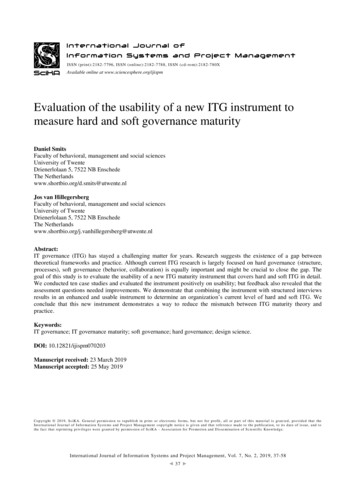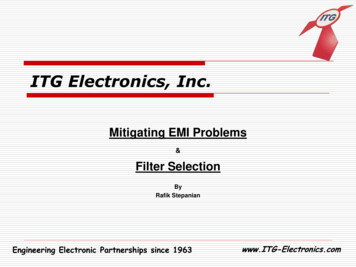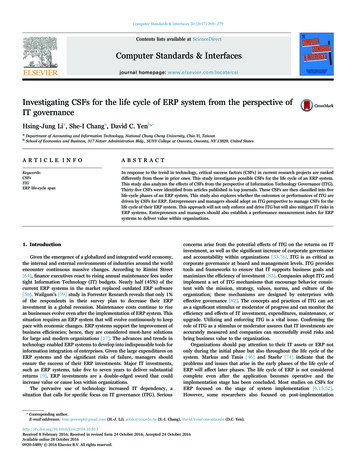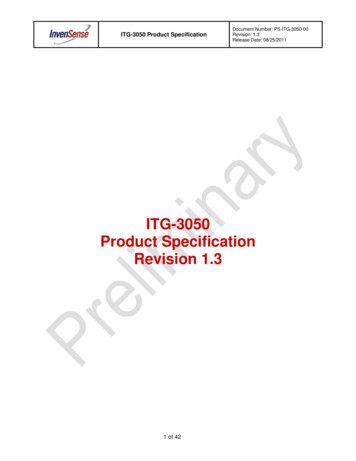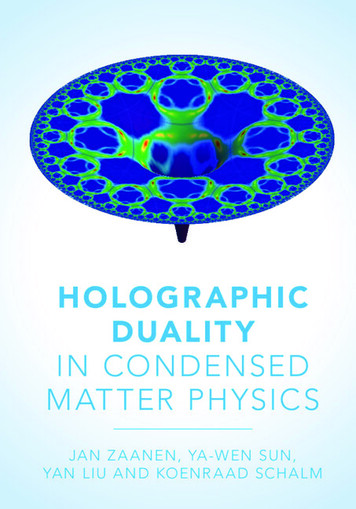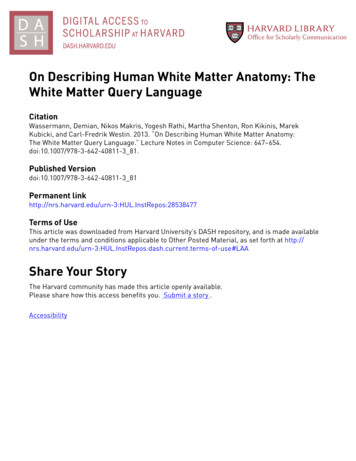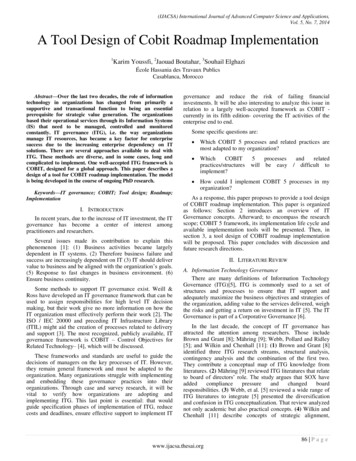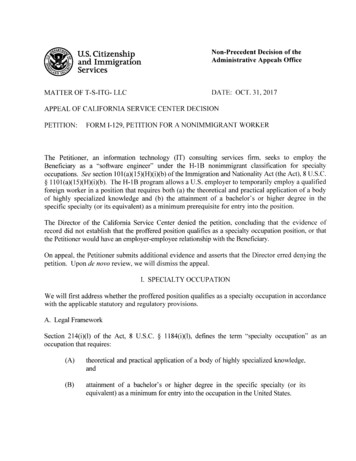
Transcription
Non-Precedent Decision of theAdministrative Appeals OfficeMATTER OF T-S-ITG- LLCDATE: OCT.31,2017APPEAL OF CALIFORNIA SERVICE CENTER DECISIONPETITION:FORM I-129, PETITION FOR A NONIMMIGRANT WORKERThe Petitioner, an information technology (IT) consulting services firm, seeks to employ theBeneficiary as a "software engineer" under the H-1 B nonimmigrant classification for specialtyoccupations. See section 101(a)(15)(H)(i)(b) ofthe Immigration and Nationality Act (the Act), 8 U.S.C.§ 110l(a)(l5)(H)(i)(b). The H-1B program allows a U.S. employer to temporarily employ a qualifiedforeign worker in a position that requires both (a) the theoretical and practical application of a bodyof highly specialized knowledge and (b) the attainment of a bachelor's or higher degree in thespecific specialty (or its equivalent) as a minimum prerequisite for entry into the position.The Director of the California Service Center denied the petition, concluding that the evidence ofrecord did not establish that the proffered position qualifies as a specialty occupation position, or thatthe Petitioner would have an employer-employee relationship with the Beneficiary.On appeal, the Petitioner submits additional evidence and asserts that the Director erred denying thepetition. Upon de novo review, we will dismiss the appeal.I. SPECIALTY OCCUPATIONWe will first address whether the proffered position qualifies as a specialty occupation in accordancewith the applicable statutory and regulatory provisions.A. Legal FrameworkSection 214(i)(l) of the Act, 8 U.S.C. § 1184(i)(l), defines the term "specialty occupation" as anoccupation that requires:(A)theoretical and practical application of a body of highly specialized knowledge.and(B)attainment of a bachelor's or higher degree in the specific specialty (or itsequivalent) as a minimum for entry into the occupation in the United States.
.Matter ofT-S-ITG- LLCThe regulation at 8 C.F.R. § 214.2(h)(4)(ii) largely restates this statutory definition, but adds anon-exhaustive list of fields of endeavor. In addition, the regulations provide that the profferedposition must meet one of the following criteria to qualify as a specialty occupation:(1)A baccalaureate or higher degree or its equivalent is normally the minimumrequirement for entry into the particular position;(2)The degree requirement is common to the industry in parallel positions amongsimilar organizations or, in the alternative, an employer may show that itsparticular position is so complex or unique that it can be performed only by anindividual with a degree;(3)The employer normally requires a degree or its equivalent for the position; or( 4)The nature of the specific duties [is] so specialized and complex that knowledgerequired to perform the duties is usually associated with the attainment of abaccalaureate or higher degree.8 C.F.R. § 214.2(h)(4)(iii)(A). We have consistently interpreted the term "degree" to mean not justany baccalaureate or higher degree, but one in a specific specialty that is directly related to theproposed position. See Royal Siam Corp. v. Cherto ff; 484 F.3d 139, 147 (1st Cir. 2007) (describing"a degree requirement in a specific specialty" as "one that relates directly to the duties andresponsibilities of a particular position"); Defensor v. Meissner, 201 F.3d 384, 387 (5th Cir. 2000).B. Proffered PositionThe Petitioner stated that the proffered position is a software engineer position. 1 In addition, thePetitioner stated that the Beneficiary would be assigned to its end-client' s place of business inMontana, and that the Beneficiary would be working on a project identified as "In response to the Director's request for evidence (RFE), the Petitioner submitted a letter from the endclient, which included the Beneficiary's job duties in the proffered position as follows (verbatim): 2The Beneficiary will spend 60% of her time on the following Job Duties on Module2, Module 3, Module 4, Module 6, Module 7 and Module 9: Develop test specifications for testing reader connectivity and configuration1Throughout the record of proceedings, the Petitioner also references the proffered position as "'software qualityassurance engineer."2The end-client mistakenly and repeatedly references the Beneficiary in the feminine pronoun case in its letter. Therecord provides no explanation for this inconsistency. Thus, we must question the accuracy of the Jetter and whether theinformation provided is correctly attributed to this particular Beneficiary and position.2
.Matter ofT-S-ITG- LLC Develop simulation data for passive tags foruse casesDevelop diagnostics utilities to generate EPC codes and UCC codes and controlserialized dataDevelop user interface tests using C# and .NET and document error codes anddebug procedures.Create test documentation and black box test scenarios.Work with project delivery team to develop project acceptance criteria for clientdeployments.Write clear, complete, concise bug reports using appropriate details, call stacks,screenshots, and repro steps.Identify, review, and incorporate changes in web application, database and thedocumentation.Perform testing in multiple domains like functional, performance, stress andusability.Regress bug fixes and implement new test cases as needed.Proactively review test pass results and investigate the failuresThe Beneficiary will spend 40% of her time on the following Job Duties on Module2, Module 3, Module 4, Module 6, Module 7 and Module 9: Review and publish test cases on requirements gathering sessions.Execute successful model to enhance bandwidth and testing cycles.Record, assess and approve Tracking system issues, suggested ownership, priorityand issues.Oversee defects to progress on time and stick to defect tracking standards.Manage QA environment on build and release management.Offer accurate status on defect information and metrics.Communicate at all levels, handle multiple projects and work on business criticalsolutions.Enhance testing capabilities guided by standard best practices, policies andprocedures.Mentor QU analysts testing activities on test plan and test case development.Coordinate with business analysts and development teams to assess requirementsand engage in project review and status meetings.Setup and manage communications between development teams.The end-client letter also states that the position requires a bachelor's degree in computerscience/applications, engineering, or another information technology related field of study.Moreover, the Petitioner provided the same job description as the end-client and stated that the positionrequires "at least a Bachelor's degree or equivalent in Computer Science, Computer InformationSystems, Computer Applications, Information Technology, Engineering (any), Math, Business,Commerce or other related technical field."
.Matter ofT-S-ITG- LLCC. AnalysisFor the reasons set out below, we have determined that the Petitioner has not demonstrated that theproffered position qualifies as a specialty occupation? Specifically, the record does not establish thatthe job duties require an educational background, or its equivalent, commensurate with a specialty.4occupation.1. Requirements for the PositionAs a preliminary matter, we find that the Petitioner has provided inconsistent statements regardingthe minimum requirements for the proffered position. The table below summarizes the variances inthe educational requirements.Record of ProceedingsPetitioner's Initial Letter of SupportPetitioner's Job PostingEnd-Client's LetterLetter fromMinimum RequirementsBachelor' s degree Ill computer science, computerinformation systems, computer applications, informationtechnology, engineering (any), math, business, commerce,or other related technical fieldMaster's degree Ill computer science, engmeenng,information technology, mathematics, physics, or a relatedfield and six months experienceBachelor' s degree Ill computer science/applications,engineering, or another information technology related fi eldBachelor' s degree Ill computer science, computerinformation systems, or a closely related fieldThe Petitioner did not provide an explanation for the variances in the requirements.2. Bachelor's in BusinessFurthermore, the Petitioner stated that a bachelor's degree in business is sufficient for the profieredposition. A petitioner must demonstrate that the proffered position requires a precise and specificcourse of study that relates directly and closely to the position in question. There must be a closecorrelation between the required specialized studies and the position; thus, the mere requirement of ageneral degree, such as business, without further specification, does not establish the position as aspecialty occupation. C.f Matter of Michael Hertz Assocs., 19 I&N Dec. 558, 560 (Comm ' r 1988)("The mere requirement of a college degree for the sake of general education, or to obtain what anemployer perceives to be a higher caliber employee, also does not establish eligibility.''). Thu s," Although some aspects of the regulatory criteria may overlap, we will address each of the criteria individually.The Petitioner submitted documentation in support of the H-1 B petition, including evidence regarding the profferedposition and its business operations. While we may not discuss every document submitted, we have reviewed andconsidered each one.44
Matter ofT-S-ITG- LLCwhile a general-purpose bachelor's degree in business may be a legitimate prereqms1te for aparticular position, requiring such a degree, without more, will not justify a finding that a particularposition qualifies for classification as a specialty occupation. Royal Siam Corp., 484 F .3d at 14 7. 53. Bachelor's Degree in Disparate FieldsMoreover, the Petitioner stated that a degree in one of several disparate fields (e.g., computerscience, computer information systems, computer applications, information technology, engineering(any), math, business, commerce) is sufficient for the position. In general, provided the specialtiesare closely related, a minimum of a bachelor's or higher degree in more than one specialty isrecognized as satisfying the "degree in the specific specialty (or its equivalent)" requirement ofsection 214(i)(l )(B) of the Act. In such a case, the required "body of highly specialized knowledge"would essentially be the same.A minimum entry requirement of degrees in disparate fields, however, would not meet the statutoryrequirement that the degree be "in the specific specialty (or its equivalent)," unless the Petitionerestablishes how each field is directly related to the duties and responsibilities of the particularposition such that the required "body of highly specialized knowledge'' is essentially anamalgamation of these different specialties. 6 Section 214(i)(l )(B) of the Act (emphasis added). ThePetitioner has not made this showing.Nevertheless, we will analyze the evidence of record to determine whether the proffered position asdescribed qualifies as a specialty occupation pursuant to the criteria at 8 C.F.R. § 214.2(h)(4)(iii)(A).4. First CriterionWe tum first to the criterion at 8 C.F.R. § 214.2(h)(4)(iii)(A)(l), which requires that a baccalaureateor higher degree in a specific specialty, or its equivalent, is normally the minimum requirement forentry into the particular position. To inform this inquiry, we recognize the U.S. Department ofLabor's (DOL) Occupational Outlook Handbook (Handbook) as an authoritative source on theduties and educational requirements of the wide variety of occupations that it addresses. 75A general degree requirement does not necessarily preclude a proffered position from qualifying as a specialtyoccupation. For example, an entry requirement of a bachelor's or higher degree in business administration with aconcentration in a specific field, or a bachelor's or higher degree in business administration combined with relevanteducation, training, or experience may, in certain instances, qualify the proffered position as a spe ialty occupation. Ineither case, it must be demonstrated that the entry requirement is equivalent to a bachelor's or higher degree in a specificspecialty that is directly related to the proffered position.6While the statutory "the" and the regulatory "a" both denote a singular "specialty,'" we do not so narrowly interpretthese provisions to exclude positions from qualifying as specialty occupations if they permit, as a minimum entryrequirement, degrees in more than one closely related specialty. See section 214(i)(1 )(B) of the Act; 8 C.F.R.§ 2 I 4.2(h)(4)(ii). This also includes even seemingly disparate specialties providing, again, the evidence of recordestablishes how each acceptable, specific field of study is directly related to the duties and responsibilities of theparticular position.7All of our references are to the 2016-17 edition of the Handbook, which may be accessed at the Internet site5
.Matter ofT-S-ITG- LLCOn the labor condition application (LCA) 8 submitted in support of the H-IB petition, the Petitionerdesignated the proffered position under the occupational category "Computer Occupations, All Other,"corresponding to the Standard Occupational Classification code 15-1131 at a Level I wage. 9We note that there are occupational categories which are not covered in detail by theHandbook. 10 The Handbook suggests that for at least some of the occupations, little meaningfulinformation could be developed. When the Handbook does not support the proposition that aproffered position is a specialty occupation, it is the Petitioner' s responsibility to provide probativeevidence (e.g. , documentation from other objective, authoritative sources) that indicates whether theparticular position in question qualifies as a specialty occupation. We will consider and weigh all ofthe evidence presented.In response to the Director's RFE, the Petitioner submitted a. an associate professor atsoftware engineer is clearly a specialty occupation, and requiresscience, computer information systems, or a closely related field .assertions but, for the following reasons, determinedvalue.position evaluation fromwhich stated that the position ofa bachelor' s degree in computerWe carefully evaluatedhis opinions lent little probativeFirst,does not reference, cite, or discuss any studies, surveys, industrypublications, authoritative publications, or other sources of empirical information which he mayhave consulted to complete his evaluation. Second,does not discuss the duties ofhttp://www.bls.gov/ooh/. We do not, however, maintain that the Handbook is the exclusive source of re levantinformation. That is, the occupational category designated by the Petitioner is considered as an aspect in establishing thegeneral tasks and responsibilities of a proffered position, and we regularly review the Handbook on the duties andeducational requirements of the wide variety of occupations that it addresses. To sati sfy the first criterion, however, th eburden of proof remains on the Petitioner to submit sufficient evidence to support a finding that its particular positionwould normally have a minimum , specialty degree requirement, or its equivalent, for entry.8The Petitioner is required to submit a certified LCA to demonstrate that it will pay an H-IB worker the higher of e itherthe prevailing wage for the occupational classification in the "area of employment" or the actual wage paid by theemployer to other employees with similar experience and qualifications who are perfo rming the same services. SeeMatter ofSimeio Solutions, LLC, 26 I&N Dec. 542, 545-546 (AAO 20 15).9A Level I wage rate is generally appropriate for positions for which the Petitioner expects the Beneficiary to have abasic understanding of the occupation . This wage rate indicates: (I) that the Beneficiary will be expected to performroutine tasks that require limited, if any, exercise of judgment; (2) that he will be close ly supervised and his work closelymonitored and reviewed for accuracy; and (3) that he will receive specific instructions on required tasks and expectedresults. U.S. Dep't of Labor, Emp't & Training Admin. , Prevailing Wage Determination Policy Guidance, Nonagric.Immigration Programs (rev. Nov. 2009), available at http://flcdatacenter.com/download/NPWHC GuidanceRevised ll 2009.pdf A prevailing wage determination starts with an entry level wage and progresses to a higher wagelevel after considering the experience, education, and skill requirements of the Petitioner' s job opportunity. !d.10We note that occupational categories for which the Handbook only includes summary data includes a range ofoccupations, including for example, postmasters and mail superintendents ; agents and business managers of artists,performers, and athletes; farm and home management advisors ; audio-visual and multimedia collections specialists;clergy; merchandise displayers and window trimmers; radio operators; first-line supervisors of police and detectives;crossing guards; travel guides; agricultural inspectors, as we ll as others.
.Matter ofT-S-!TG- LLCthe proffered position in any substantive detail. To the contrary, he simply listed the tasks in bulletpoint fashion without discussion. Third, the record does not indicate whetherwas aware that, as indicated by the Level I wage on the LCA, the Petitioner considered the profferedposition to be an entry-level position for a beginning employee who has only a basic understandingof the occupation. In other words, the Petitioner has not demonstrated thatpossessed the requisite information to adequately assess the nature of the position. As such, we findthatopinion letter lends little probative value. Matter of Caron Jnt '!, 19 I&NDec. 791, 795 (Comm'r 1988) (The service is not required to accept or may give less weight to anadvisory opinion when it is "not in accord with other information or is in any way questionable.'').For efficiency's sake, we hereby incorporate the above discussion regarding the letter into ouranalysis of each criterion at 8 C.F.R. § 214.2(h)( 4)(iii)(A).On appeal, the Petitioner submits a copy of the Occupational Information Network's (O*NET)summary report for the occupational category "Software Quality Assurance Engineers and Testers,"and claims that this subcategory under the heading of "Computer Occupations, All Others" is themost relevant occupational category for the proffered position. The summary report providesgeneral information regarding the occupation; however, it does not support the Petitioner's assertionregarding the educational requirements for the occupation.Under the subsection entitled "Education," O*NET states that "[m]ost of these occupations require afour-year bachelor's degree, but some do not." Moreover, O*NET does not state that a degree mustbe in a spec?fic specialty. Furthermore, the Specialized Vocational Preparation (SVP) rating citedwithin O*NET's Job Zone designates this occupation as 7 8. That SVP rating indicates theoccupation requires "over 2 years up to and including 4 years" of training. Further, while the SVPrating indicates the total number of years of vocational preparation required for a particular position,it is important to note that it does not describe how those years are to be divided among training,formal education, and experience- and it does not specify the particular type of degree, if any, that aposition would require. 11The Petitioner also asserts that "70% of the respondents require a bachelor's degree." The summaryreport, however, provides the educational requirements of "respondents," but does not account for100% of the "respondents." The respondents' positions within the occupation are not distinguishedby career level (e.g., entry-level, mid-level, senior-level). Additionally, the graph in the summaryreport does not indicate that the "education level" for the respondents must be in a specific specialty.In the instant matter, the Petitioner has not provided sufficient documentation from a probativesource to substantiate its assertion regarding the minimum requirement for entry into this particularposition. Thus, the Petitioner has not satisfied the criterion at 8 C.F.R. § 214.2(h)(4)(iii)(A)(J).5. Second Criterion11For additional information, see the O*NET Online Help webpage available at http://www.onetonline.org/help/online/svp.
Matter ojT-S-ITG- LLCThe second criterion presents two alternative prongs: "The degree requirement is common to theindustry in parallel positions among similar organizations or, in the alternative, an employer mayshow that its particular position is so complex or unique that it can be performed only by anindividual with a degree[.]" 8 C.F.R. § 214.2(h)(4)(iii)(A)(2) (emphasis added). The first prongcasts its gaze upon the common industry practice, while the alternative prong narrows its focus to thePetitioner's specific position.a. First ProngTo satisfy the first prong of the second criterion, the Petitioner must establish that the "degreerequirement" (i.e., a requirement of a bachelor's or higher degree in a specific specialty, or itsequivalent) is common to the industry in parallel positions among similar organizations.We generally consider the following sources of evidence to determine if there is such a commondegree requirement: whether the Handbook reports that the industry requires a degree; whether theindustry's professional association has made a degree a minimum entry requirement; and whetherletters or affidavits from firms or individuals in the industry establish that such firms "routinelyemploy and recruit only degreed individuals." See Shanti, Inc. v. Reno, 36 F. Supp. 2d 1151, 1165(D. Minn. 1999) (quoting Hird/Blaker Corp. v. Sava, 712 F. Supp. 1095, 1102 (S.D.N.Y. 1989)(considering these "factors" to inform the commonality of a degree requirement)).As previously discussed, the Petitioner has not established that its proffered position is one for whichthe Handbook, or another authoritative source, reports a requirement for at least a bachelor's degreein a specific specialty, or its equivalent. We incorporate by reference the previous discussion on thematter.On appeal, the Petitioner submits copies of job announcements placed by the Petitioner as well asother employers. However, upon review of the documents, we find that the Petitioner's reliance onthe job announcements is misplaced. First, we note that the Petitioner did not establish that theadvertising organizations are similar to the Petitioner. For example, the advertisements provide littleor no information regarding the hiring employers. The Petitioner did not supplement the record ofproceedings to establish that these advertising organizations are similar to it.When determining whether the Petitioner and the organization share the same generalcharacteristics, such factors may include information regarding the nature or type of organization,and, when pertinent, the particular scope of operations, as well as the level of revenue and staffing(to list just a few elements that may be considered). Upon review, some of the employers for whichthe job postings are submitted include an international media company, a telecommunicationscompany, and a Content Delivery Network services company, entities that cannot be considered tobe within the same industry as the Petitioner. It is not sufficient for the Petitioner to claim that anorganization is similar and in the same industry without providing a basis for such an assertion.
.Matter ofT-S-ITG- LLCMoreover, not every posting requires a minimum of a bachelor's degree in a specific specialty forentry into the occupation of software engineer. For example, the posting bywill accept ageneral-purpose bachelor's degree in business administration plus experience.As the documentation does not establish that the Petitioner has met this prong of the regulations,further analysis regarding the specific information contained in each of the job postings is not13necessary. 12 That is, not every deficit of every job posting has been addressed.The Petitioner also submits excerpts from the websites ofandwhich summarize these schools' degree programs in Management InformationSystem (MIS). The Petitioner concludes that graduates of similar programs with a bachelor's degreein MIS routinely are employed in the position of software quality assurance engineers andtesters/quality assurance specialists. These articles, however, demonstrate simply that a degree inMIS can qualify an individual to perform duties related to those of the proffered position as well asnumerous other occupations; however, they do not establish that that the occupation of softwareengineer usually mandates a bachelor's degree in a specific specialty, or its equivalent, within thePetitioner's industry.The Petitioner also submits excerpts from the websites ofwhichtheand thedemonstrate that degrees in mathematics can qualify individuals for jobs in the informationtechnology sector. Again, while a degree in mathematics may be a legitimate prerequisite for entryinto the position of software engineer, or the information technology field in general, the issue hereis whether a requirement of a bachelor's or higher degree in a spec?fic specialty, or its equivalent, iscommon to the industry in parallel positions among similar organizations. The Petitioner has notestablished such a requirement.Without more, the Petitioner has not provided sufficient evidence to establish that a bachelor'sdegree in a specific specialty, or its equivalent, is common to the industry in parallel positionsamong similar organizations. Thus, the Petitioner has not satisfied the first alternative prong of8 C.F.R. § 214.2(h)(4)(iii)(A)(2).12The Petitioner did not provide any independent evidence of how representative the job postings are of the particularadvertising employers' recruiting history for the type of job advertised. As the advertisements are only solicitations forhire, they are not evidence of the actual hiring practices of these employers.13Even if all of the job postings indicated that a requirement of a bachelor's degree in a specific specialty is common tothe industry in parallel positions among similar organizations (which they do not), the Petitioner has not demonstratedwhat statistically valid inferences, if any, can be drawn from the advertisements with regard to determining the commoneducational requirements for entry into parallel positions in similar organizations. See generally Earl Babbie, ThePractice of Social Research 186-228 ( 1995). Moreover, given that there is no indication that the advertisements wererandomly selected, the validity of any such inferences could not be accurately determined even if the sampling unit weresufficiently large. See id. at 195-196 (explaining that "[r]andom selection is the key to [the] process [of probabilitysampling]" and that "random selection offers access to the body of probability theory, which provides the basis forestimates of population parameters and estimates of error").9
Matter ofT-S-ITG- LLCb. Second ProngWe will next consider the second alternative prong of 8 C.F.R. § 214.2(h)(4)(iii)(A)(2), which issatisfied if the Petitioner shows that its particular position is so complex or unique that it can beperformed only by an individual with at least a bachelor's degree in a specific specialty, or itsequivalent.In support of its assertion that the proffered position qualifies as a specialty occupation, thePetitioner described the proffered position and its business operations. In its letter of support, thePetitioner asserted that the job duties for the proffered position require "conceptual, theoretical, andanalytical knowledge" associated with a bachelor's degree. However, the Petitioner designated theproffered position as an entry-level position within the occupational category (by selecting a Level Iwage). 14 This designation, when read in combination with the Petitioner and the end-client's jobdescriptions, further suggests that the particular position is not so complex or unique that the dutiescan only be performed an individual with bachelor's degree or higher in a specific specialty, or itsequivalent. While related courses may be beneficial in performing certain duties of the position, thePetitioner has not demonstrated how an established curriculum of courses leading to a baccalaureateor higher degree in a specific specialty, or its equivalent, is required to perform the duties of theproffered position.The Petitioner claims that the Beneficiary is well-qualified for the position, and references hisqualifications. However, the test to establish a position as a specialty occupation is not the educationor experience of a proposed beneficiary, but whether the position itself requires at least a bachelor'sdegree in a specific specialty, or its equivalent. The Petitioner did not sufficiently develop relativecomplexity or uniqueness as an aspect of the duties of the position, and it did not identify any tasksthat are so complex or unique that only a specifically degreed individual could perform them.Accordingly, the Petitioner has not satisfied the second alternative prong of 8 C.F.R.§ 214.2(h)(4)(iii)(A)(2).6. Third CriterionThe third criterion of 8 C.F.R. § 214.2(h)(4)(iii)(A) entails an employer demonstrating that itnormally requires a bachelor's degree in a specific specialty, or its equivalent, for the position.14The Petitioner's designation of this position as a Level I, entry-level position undermines its claim that the position isparticularly complex, unique, and specialized compared to other positions within the same occupation. Nevertheless, aLevel I wage-designation does not preclude a proffered position from classification as a specialty occupation, just as aLevel IV wage-designation does not definitively establish such a classification. In certain occupations (e.g., doctors orlawyers), a Level I, entry-le
Matter ofT-S-ITG-LLC The regulation at 8 C.F.R. § 214.2(h)(4)(ii) largely restates this statutory definition, but adds a non-exhaustive list of fields of endeavor. In addition, the regulations provide that the proffered position must meet one of the following criteria to qualify as a specialty occupation:

